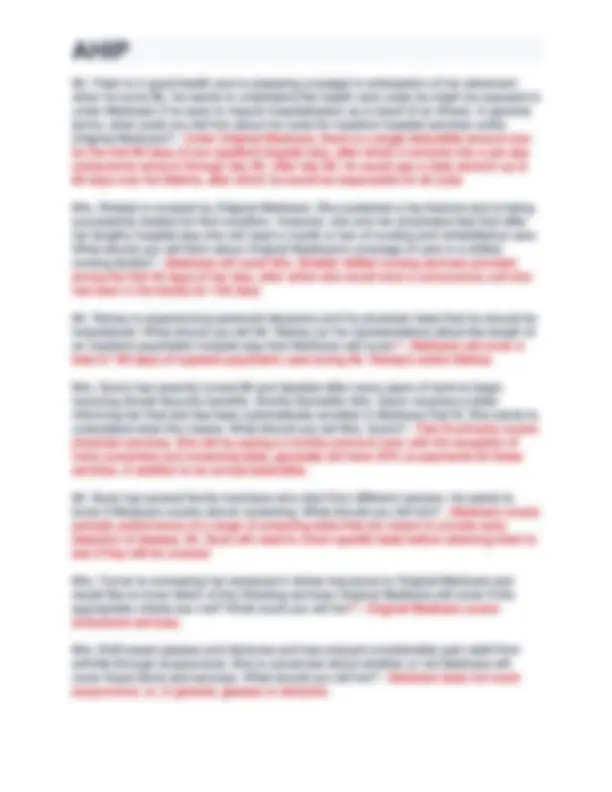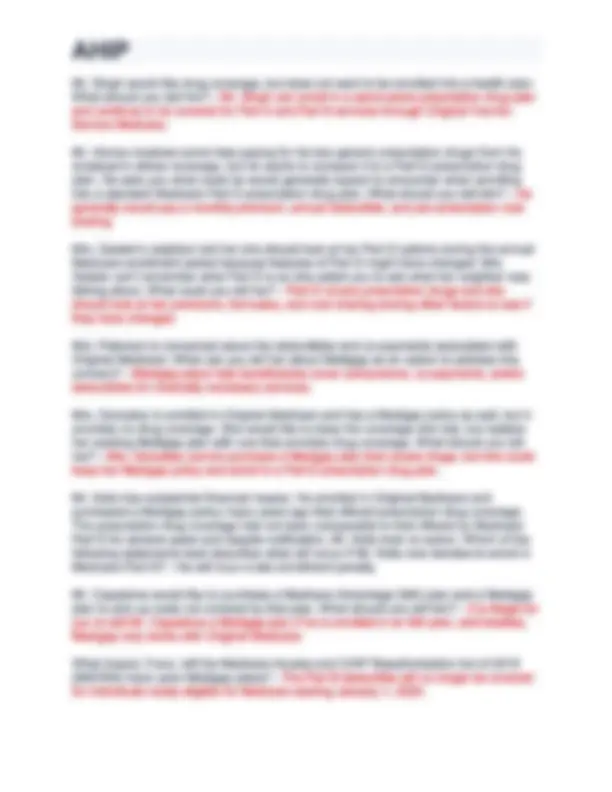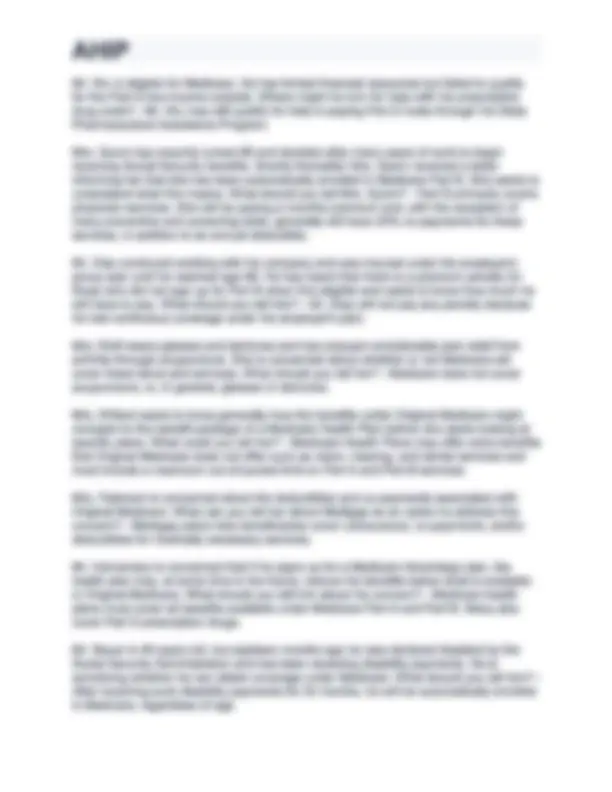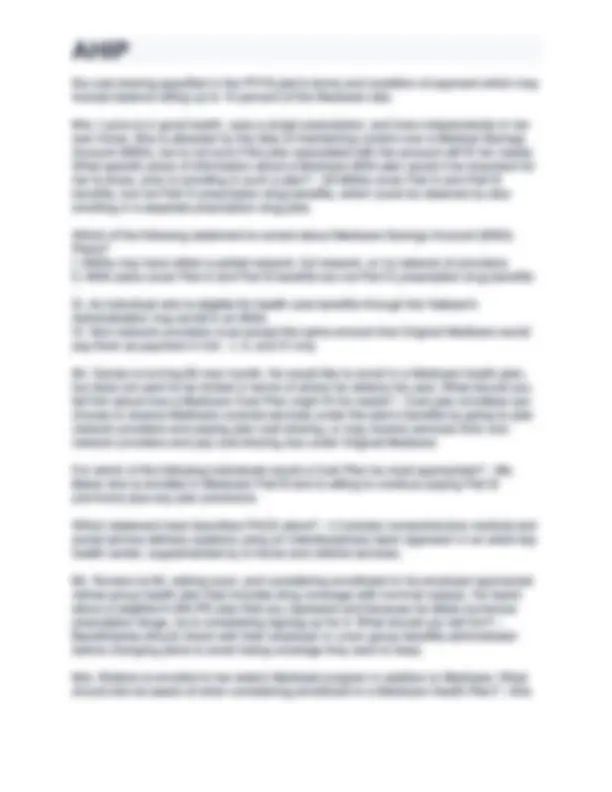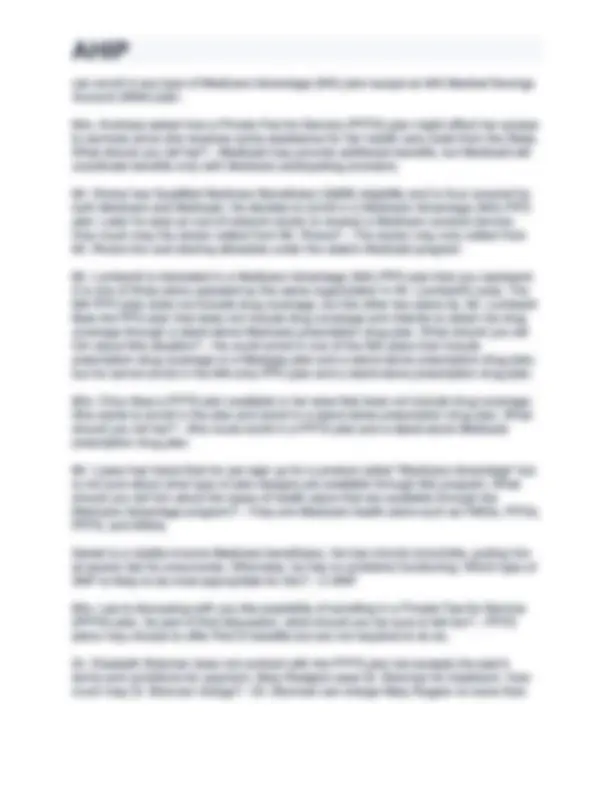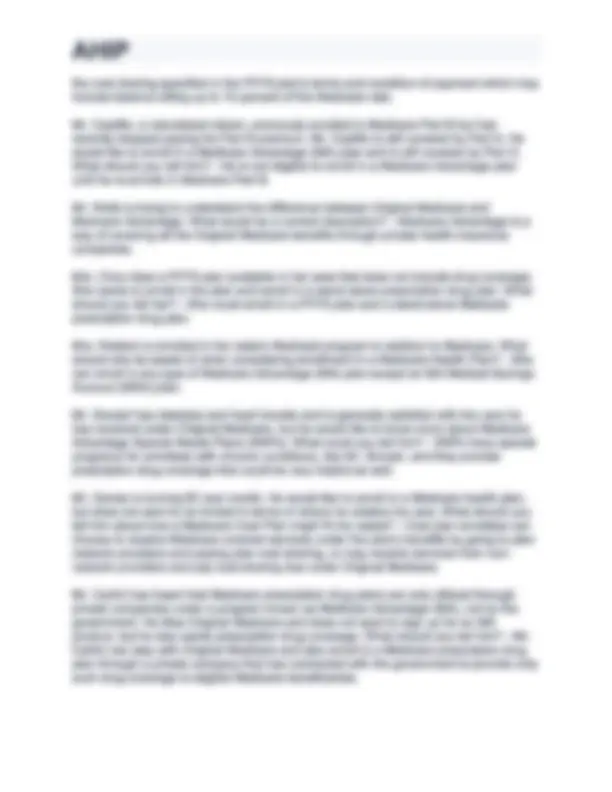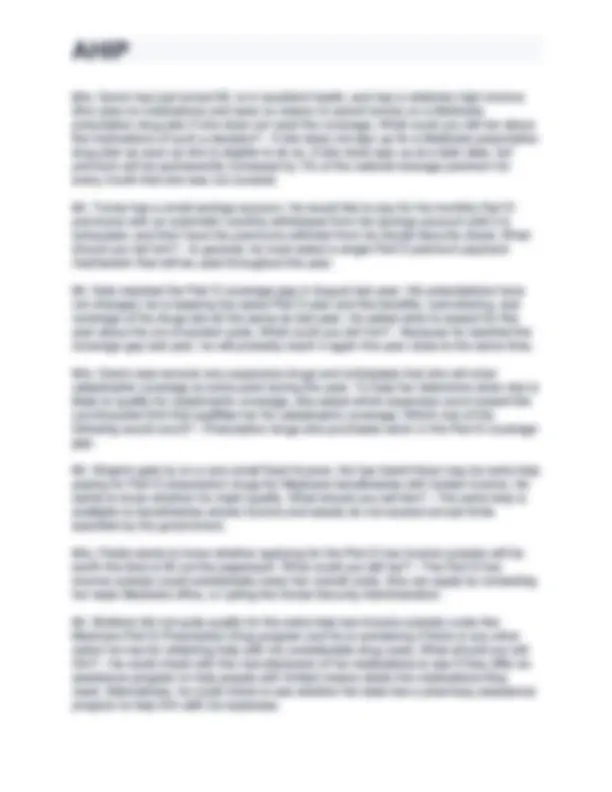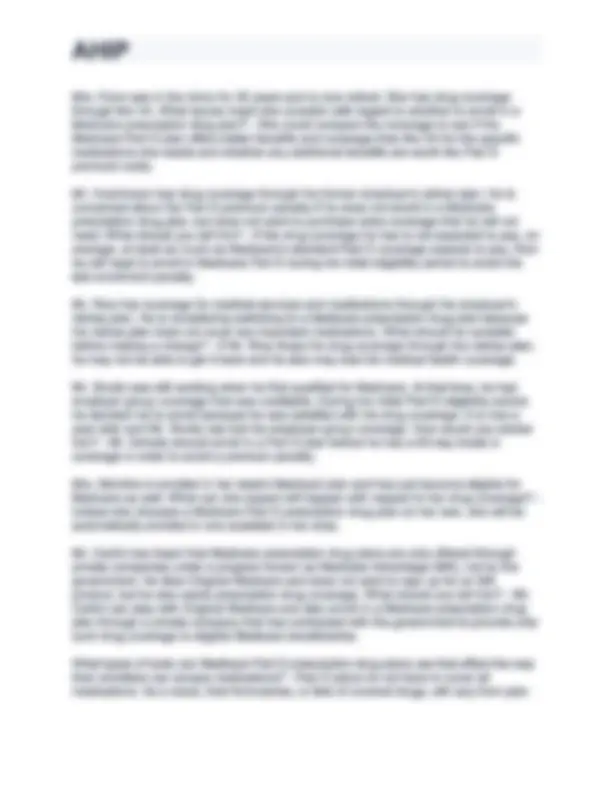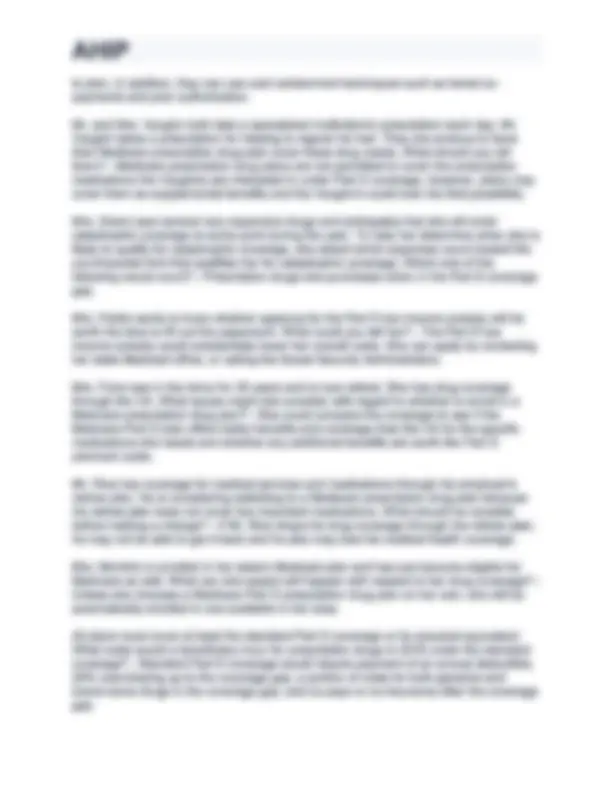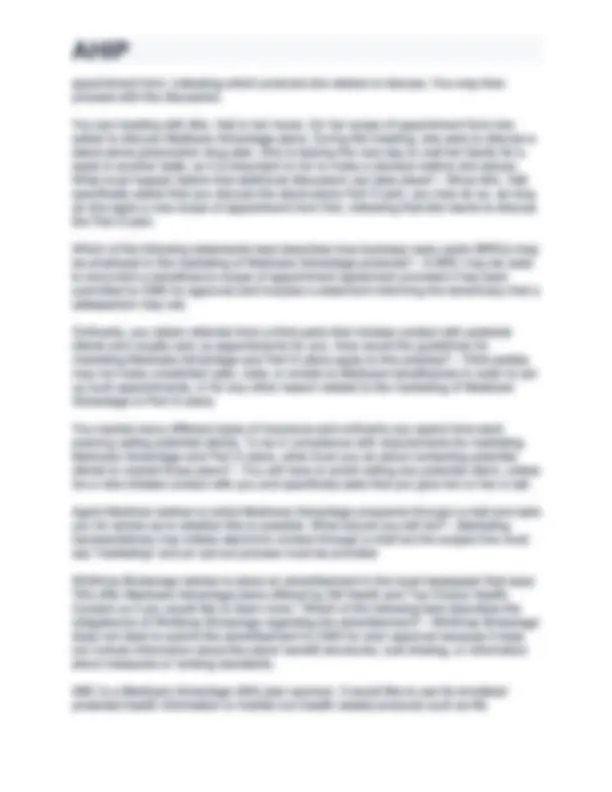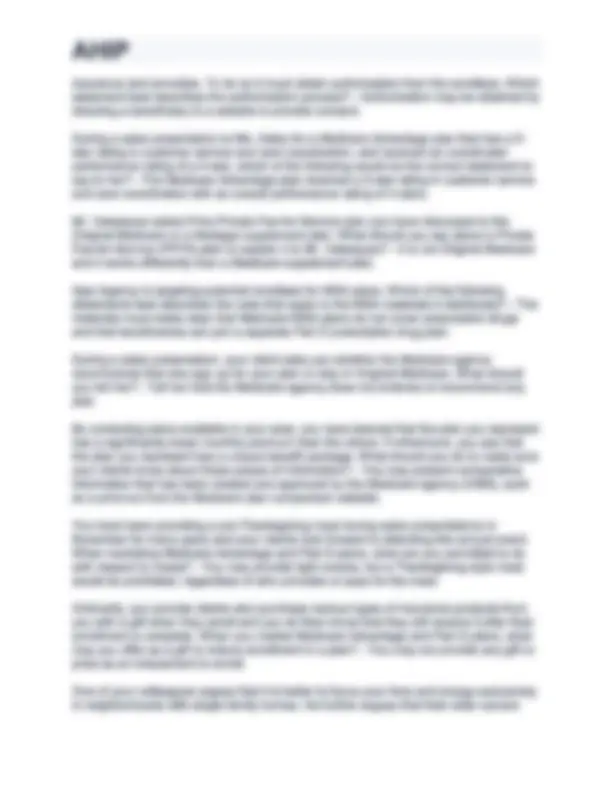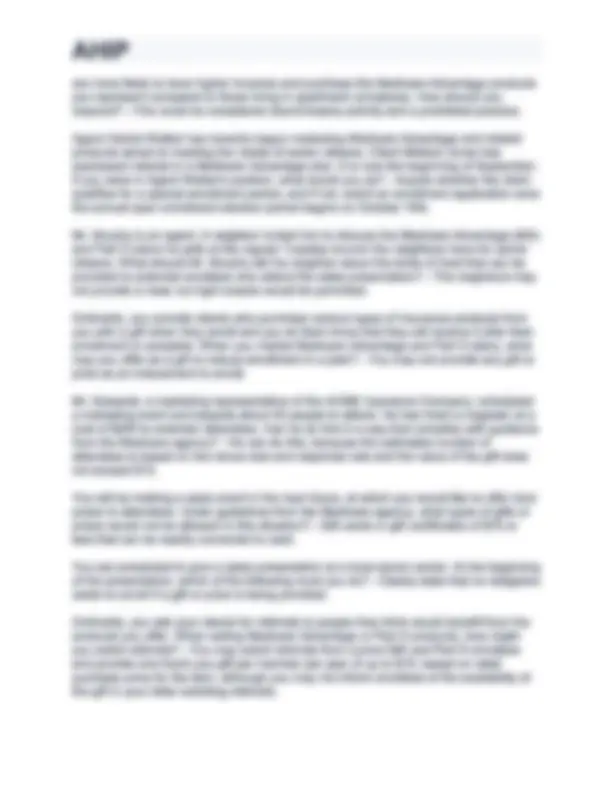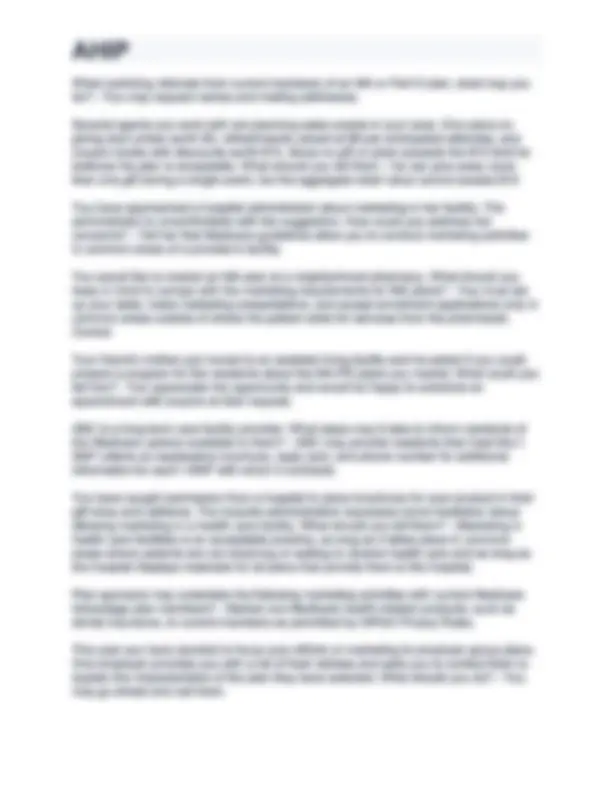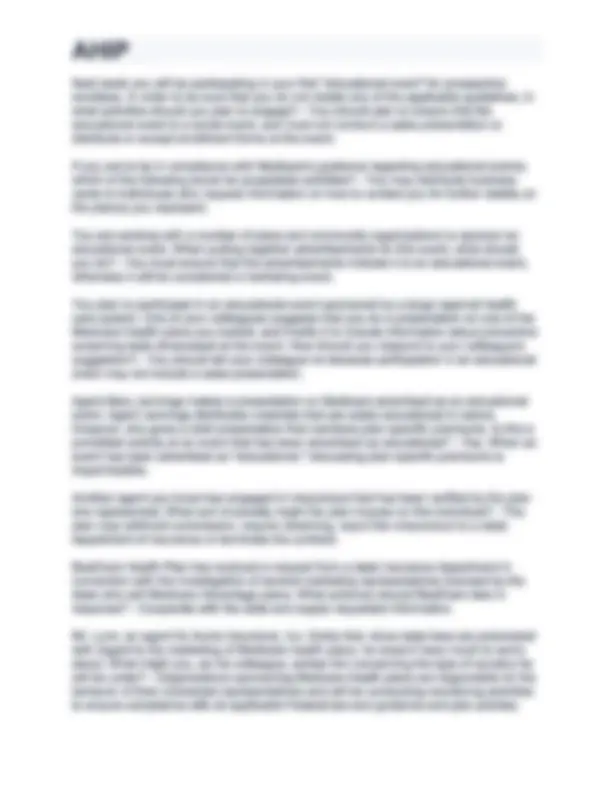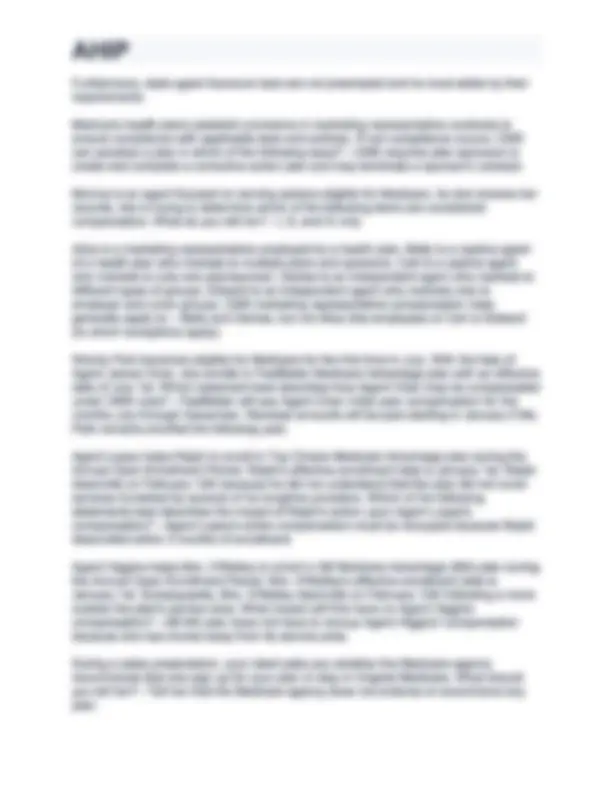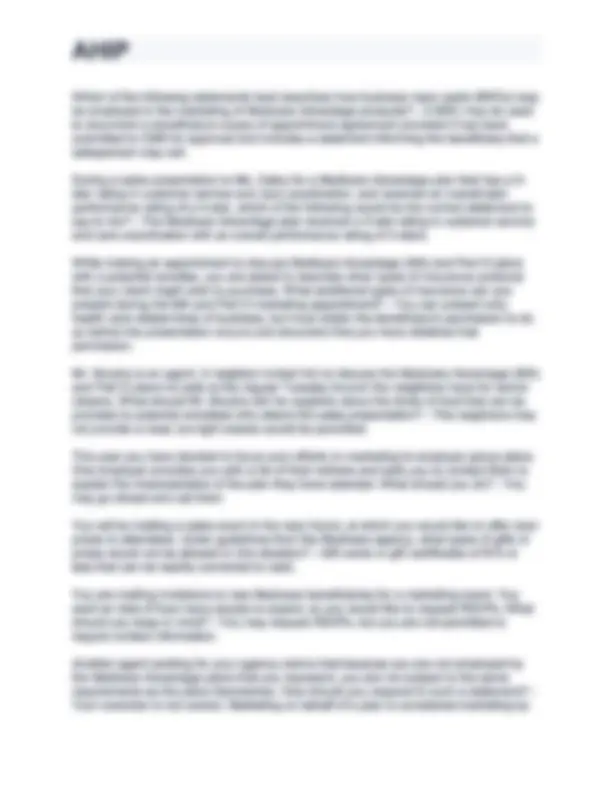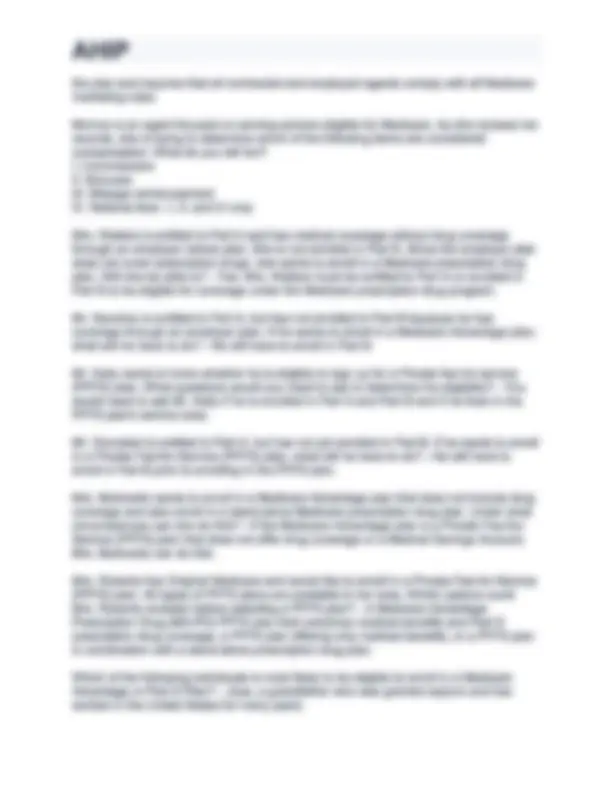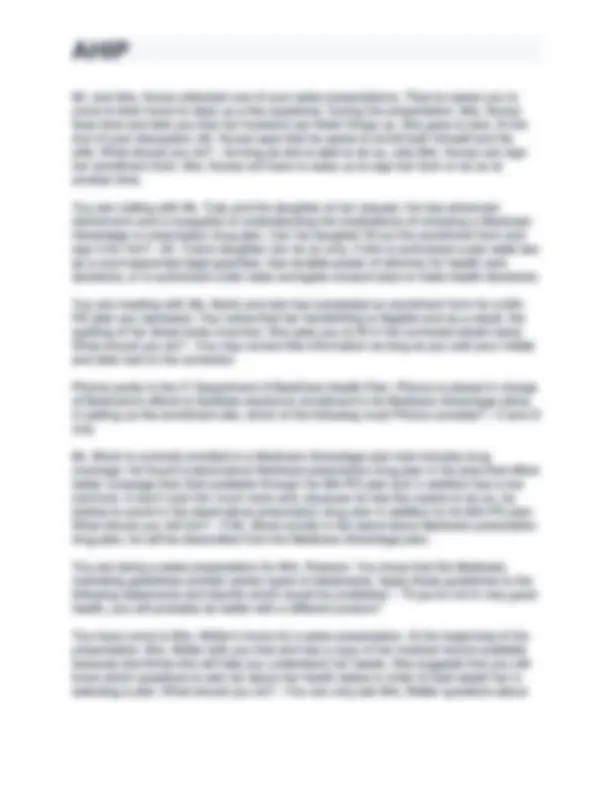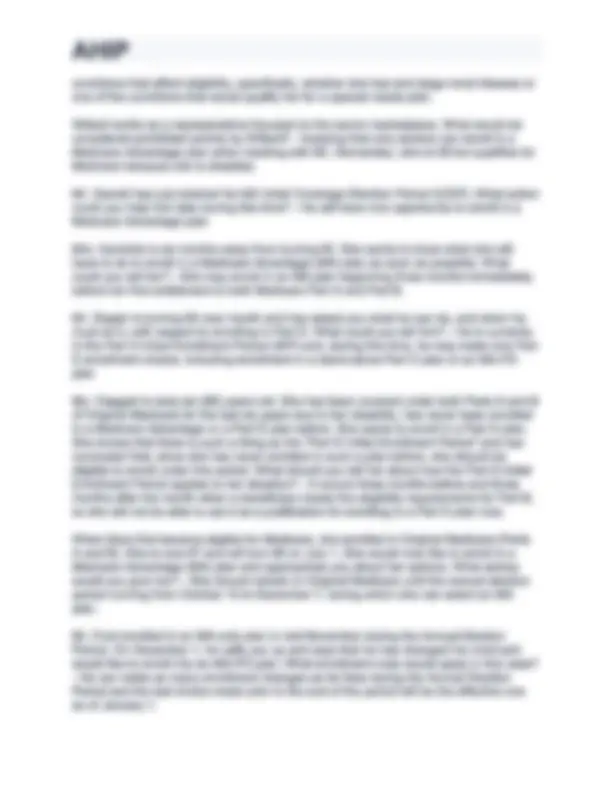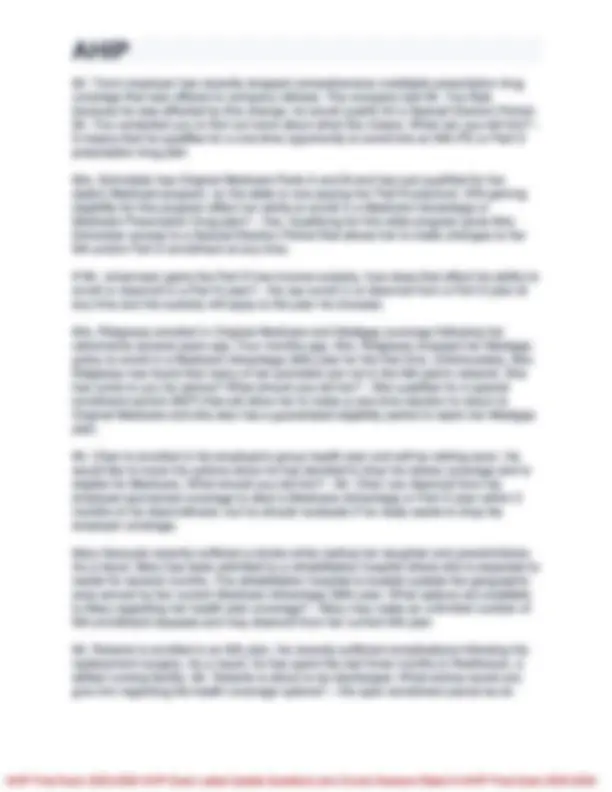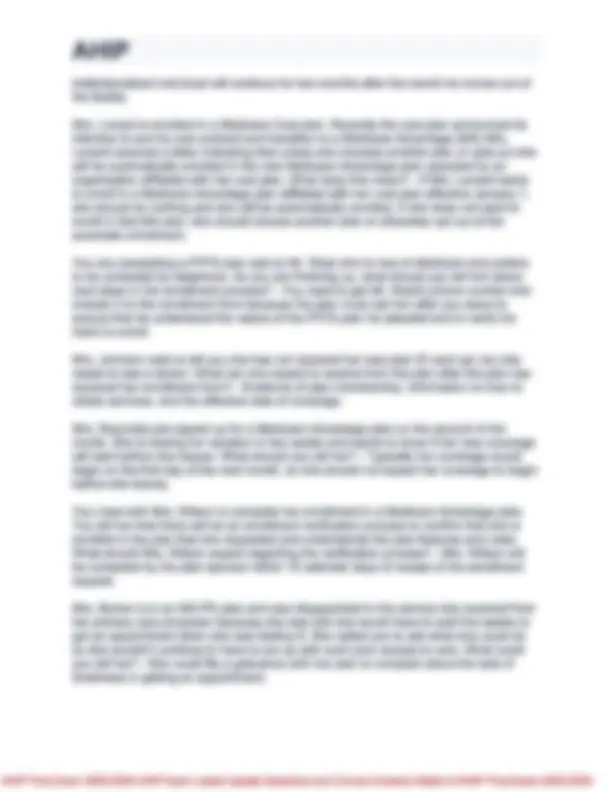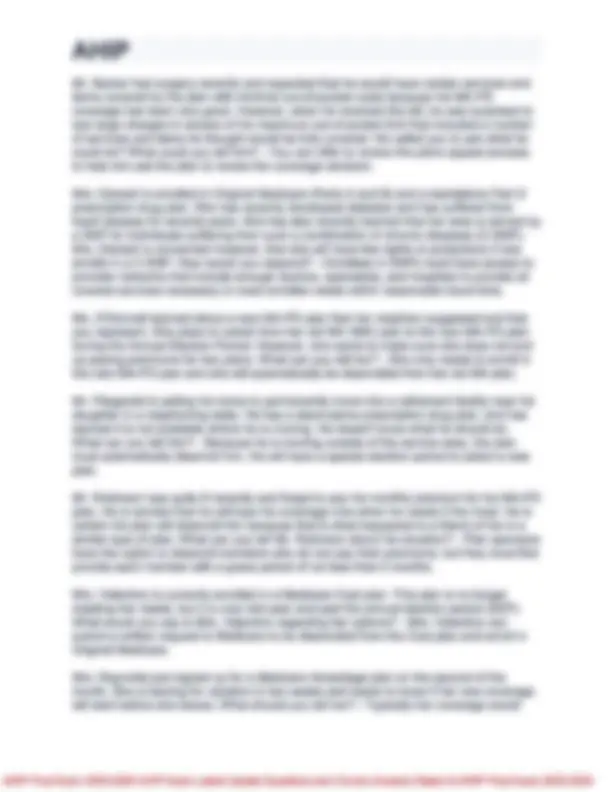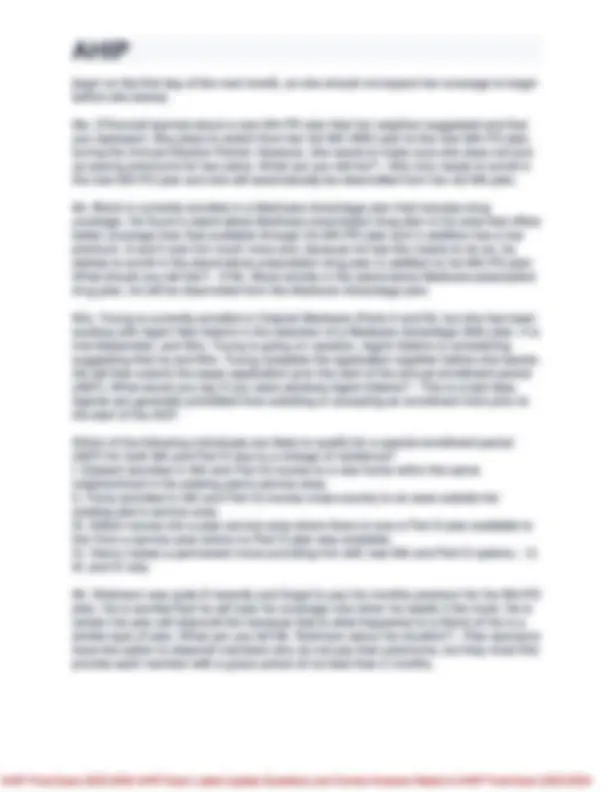Partial preview of the text
Download AHIP Final Exam 2023-2024 AHIP Exam Latest Update Questions and Correct Answers Rated A+ and more Exams Public Health in PDF only on Docsity!
AHIP AHIP Final Exam 2023-2024 Ahip Exam Latest Update Questions and Correct Answers Rated A+ Ms. Moore plans to retire when she turns 65 in a few months. She is in excellent health and will have considerable income when she retires. She is concerned that her income will make it impossible for her to qualify for Medicare. What could you tell her to address her concern? - Medicare is a program for people age 65 or older and those under age 65 with certain disabilities, end stage renal disease and Lou Gehrig's disease, so she will be eligible for Medicare. Mr. Schmidt would like to plan for retirement and has asked you what is covered under Original Fee-for-Service (FFS) Medicare? What could you tell him? - Part A, which covers hospital, skilled nursing facility, hospice and home health services and Part B, which covers professional services such as those provided by a doctor are covered under Original Medicare. Mr. Hernandez is concerned that if he signs up for a Medicare Advantage plan, the health plan may, at some time in the future, reduce his benefits below what is available in Original Medicare. What should you tell him about his concern? - Medicare health plans must cover all benefits available under Medicare Part A and Part B. Many also cover Part D prescription drugs. Mrs. Roberts has just received a new Medicare identity card in the mail. She is concerned that it is a forgery since it does not have her Social Security number on it. What should you tell her? - The card she received is valid, the change has been made to protect Medicare beneficiaries from identity theft, and she should now destroy her old card. Mrs. Willard wants to know generally how the benefits under Original Medicare might compare to the benefit package of a Medicare Health Plan before she starts looking at specific plans. What could you tell her? - Medicare Health Plans may offer extra benefits that Original Medicare does not offer such as vision, hearing, and dental services and must include a maximum out-of-pocket limit on Part A and Part B services. Mr. Meoni's wife has a Medicare Advantage plan, but he wants to understand what coverage Medicare Supplemental Insurance provides since his health care needs are different from his wife's needs. What could you tell Mr.Meoni? - Medicare Supplemental Insurance would help cover his Part A and Part B cost sharing in Original Fee-for- Service (FFS) Medicare as well as possibly some services that Medicare does not cover. Mrs. Chen will be 65 soon, has been a citizen for twelve years, has been employed full time, and paid taxes during that entire period. She is concerned that she will not qualify for coverage under part A because she was not born in the United States. What should AHIP you tell her? - Most individuals who are citizens and over age 65 are covered under Part A by virtue of having paid Medicare taxes while working, though some may be covered as a result of paying monthly premiums. Mr. Bauer is 49 years old, but eighteen months ago he was declared disabled by the Social Security Administration and has been receiving disability payments. He is wondering whether he can obtain coverage under Medicare. What should you tell him? - After receiving such disability payments for 24 months, he will be automatically enrolled in Medicare, regardless of age. Mr. Denton is 52 years old and has recently been diagnosed with end-stage renal disease (ESRD) and will soon begin dialysis. He is wondering if he can obtain coverage under Medicare. What should you tell him? - He may sign-up for Medicare at any time however coverage usually begins on the fourth month after dialysis treatments start. Ms. Henderson believes that she will qualify for Medicare coverage when she turns 65, without paying any premiums, because she has been working for 40 years and paying Medicare taxes. What should you tell her? - In order to obtain Part B coverage, she must pay a standard monthly premium, though it is higher for individuals with higher incomes. Mr. Diaz continued working with his company and was insured under his employer's group plan until he reached age 68. He has heard that there is a premium penalty for those who did not sign up for Part B when first eligible and wants to know how much he will have to pay. What should you tell him? - Mr. Diaz will not pay any penalty because he had continuous coverage under his employer's plan. Mrs. Pena is 66 years old, has coverage under an employer plan and will retire next year. She heard she must enroll in Part B at the beginning of the year to ensure no gap in coverage. What can you tell her? - She may enroll at any time while she is covered under her employer plan, but she will have a special eight-month enrollment period that differs from the standard general enrollment period, during which she may enroll in Medicare Part B. Mrs. Kelly, age 65, is entitled to Part A, but has not yet enrolled in Part B. She is considering enrollment in a Medicare health plan (Part C). What should you advise her to do before she will be able to enroll into a Medicare health plan? - In order to join a Medicare health plan, she also must enroll in Part B. Mrs. Park is an elderly retiree. She has a low, fixed income. What could you tell Mrs. Park that might be of assistance? - She should contact her state Medicaid agency to see if she qualifies for one of several programs that can help with Medicare costs for which she is responsible. Mr. Wu is eligible for Medicare. He has limited financial resources but failed to qualify for the Part D low-income subsidy. Where might he turn for help with his prescription drug costs? - Mr. Wu may still qualify for help in paying Part D costs through his State Pharmaceutical Assistance Program. AHIP Mr. Singh would like drug coverage, but does not want to be enrolled into a health plan. What should you tell him? - Mr. Singh can enroll in a stand-alone prescription drug plan and continue to be covered for Part A and Part B services through Original Fee-for- Service Medicare. Mr. Alonso receives some help paying for his two generic prescription drugs from his employer's retiree coverage, but he wants to compare it to a Part D prescription drug plan. He asks you what costs he would generally expect to encounter when enrolling into a standard Medicare Part D prescription drug plan. What should you tell him? - He generally would pay a monthly premium, annual deductible, and per-prescription cost sharing Mrs. Geisler's neighbor told her she should look at her Part D options during the annual Medicare enrollment period because features of Part D might have changed. Mrs. Geisler can't remember what Part D is so she called you to ask what her neighbor was talking about. What could you tell her? - Part D covers prescription drugs and she should look at her premiums, formulary, and cost sharing among other factors to see if they have changed. Mrs. Paterson is concerned about the deductibles and co-payments associated with Original Medicare. What can you tell her about Medigap as an option to address this concern? - Medigap plans help beneficiaries cover coinsurance, co-payments, and/or deductibles for medically necessary services. Mrs. Gonzalez is enrolled in Original Medicare and has a Medigap policy as well, but it provides no drug coverage. She would like to keep the coverage she has, but replace her existing Medigap plan with one that provides drug coverage. What should you tell her? - Mrs. Gonzalez cannot purchase a Medigap plan that covers drugs, but she could keep her Medigap policy and enroll in a Part D prescription drug plan. Mr. Kelly has substantial financial means. He enrolled in Original Medicare and purchased a Medigap policy many years ago that offered prescription drug coverage. The prescription drug coverage has not been comparable to that offered by Medicare Part D for several years and despite notification, Mr. Kelly took no action. Which of the following statements best describes what will occur if Mr. Kelly now decides to enroll in Medicare Part D? - He will incur a late enrollment penalty Mr. Capadona would like to purchase a Medicare Advantage (MA) plan and a Medigap plan to pick up costs not covered by that plan. What should you tell him? - It is illegal for you to sell Mr. Capadona a Medigap plan if he is enrolled in an MA plan, and besides, Medigap only works with Original Medicare. What impact, if any, will the Medicare Access and CHIP Reauthorization Act of 2015 (MACRA) have upon Medigap plans? - The Part B deductible will no longer be covered for individuals newly eligible for Medicare starting January 1, 2020. AHIP Mr. Wu is eligible for Medicare. He has limited financial resources but failed to qualify for the Part D low-income subsidy. Where might he turn for help with his prescription drug costs? - Mr. Wu may still qualify for help in paying Part D costs through his State Pharmaceutical Assistance Program. Mrs. Quinn has recently turned 66 and decided after many years of work to begin receiving Social Security benefits. Shortly thereafter Mrs. Quinn received a letter informing her that she has been automatically enrolled in Medicare Part B. She wants to understand what this means. What should you tell Mrs. Quinn? - Part B primarily covers physician services. She will be paying a monthly premium and, with the exception of many preventive and screening tests, generally will have 20% co-payments for these services, in addition to an annual deductible. Mr. Diaz continued working with his company and was insured under his employer's group plan until he reached age 68. He has heard that there is a premium penalty for those who did not sign up for Part B when first eligible and wants to know how much he will have to pay. What should you tell him? - Mr. Diaz will not pay any penalty because he had continuous coverage under his employer's plan. Mrs. Wolf wears glasses and dentures and has enjoyed considerable pain relief from arthritis through acupuncture. She is concerned about whether or not Medicare will cover these items and services. What should you tell her? - Medicare does not cover acupuncture, or, in general, glasses or dentures. Mrs. Willard wants to know generally how the benefits under Original Medicare might compare to the benefit package of a Medicare Health Plan before she starts looking at specific plans. What could you tell her? - Medicare Health Plans may offer extra benefits that Original Medicare does not offer such as vision, hearing, and dental services and must include a maximum out-of-pocket limit on Part A and Part B services. Mrs. Paterson is concerned about the deductibles and co-payments associated with Original Medicare. What can you tell her about Medigap as an option to address this concern? - Medigap plans help beneficiaries cover coinsurance, co-payments, and/or deductibles for medically necessary services. Mr. Hernandez is concerned that if he signs up for a Medicare Advantage plan, the health plan may, at some time in the future, reduce his benefits below what is available in Original Medicare. What should you tell him about his concern? - Medicare health plans must cover all benefits available under Medicare Part A and Part B. Many also cover Part D prescription drugs. Mr. Bauer is 49 years old, but eighteen months ago he was declared disabled by the Social Security Administration and has been receiving disability payments. He is wondering whether he can obtain coverage under Medicare. What should you tell him? - After receiving such disability payments for 24 months, he will be automatically enrolled in Medicare, regardless of age AHIP Mr. Kumar is considering a Medicare Advantage HMO and has questions about his ability to access providers. What should you tell him? - In most Medicare Advantage HMOs, Mr. Kumar must obtain his services only from providers who have a contractual relationship with the plan (except in an emergency) Mrs. Ramos is considering a Medicare Advantage PPO and has questions about which providers she can go to for her health care. What should you tell her? - Mrs. Ramos can obtain care from any provider who participates in Original Medicare, but generally will have a higher cost-sharing amount if she sees a provider who/that is not part of the PPO network. Mr. Sinclair has diabetes and heart trouble and is generally satisfied with the care he has received under Original Medicare, but he would like to know more about Medicare Advantage Special Needs Plans (SNPs). What could you tell him? - SNPs have special programs for enrollees with chronic conditions, like Mr. Sinclair, and they provide prescription drug coverage that could be very helpful as well Mr. Greco is in excellent health, lives in his own home, and has a sizeable income from his investments. He has a friend enrolled in a Medicare Advantage Special Needs Plan (SNP). His friend has mentioned that the SNP charges very low cost-sharing amounts and Mr. Greco would like to join that plan. What should you tell him? - SNPs limit enrollment to certain sub-populations of beneficiaries. Given his current situation, he is unlikely to qualify and would not be able to enroll in the SNP. Mr. Gomez notes that a Private Fee-for-Service (PFFS) plan available in his area has an attractive premium. He wants to know if he must use doctors in a network like his current HMO plan requires him to do. What should you tell him? - He may receive health care services from any doctor allowed to bill Medicare, as long as he shows the doctor the plan's identification card and the doctor agrees to accept the PFFS plan's payment terms and conditions, which could include balance billing. Mrs. Lee is discussing with you the possibility of enrolling in a Private Fee-for-Service (PFFS) plan. As part of that discussion, what should you be sure to tell her? - PFFS plans may choose to offer Part D benefits but are not required to do so. Mr. McTaggert notes that a Private Fee-for-Service (PFFS) plan available in his area has an attractive premium. He wants to know what makes them different from an HMO or a PPO. What should you tell him? - Enrollees in a PFFS plan can obtain care from any provider in the U.S. who accepts Original Medicare, as long as the provider has a reasonable opportunity to access the plan's terms and conditions and agrees to accept them. Dr. Elizabeth Brennan does not contract with the PFFS plan but accepts the plan's terms and conditions for payment. Mary Rodgers sees Dr. Brennan for treatment. How much may Dr. Brennan charge? - Dr. Brennan can charge Mary Rogers no more than AHIP the cost sharing specified in the PFFS plan's terms and condition of payment which may include balance billing up to 15 percent of the Medicare rate. Mrs. Lyons is in good health, uses a single prescription, and lives independently in her own home. She is attracted by the idea of maintaining control over a Medical Savings Account (MSA), but is not sure if the plan associated with the account will fit her needs. What specific piece of information about a Medicare MSA plan would it be important for her to know, prior to enrolling in such a plan? - All MSAs cover Part A and Part B benefits, but not Part D prescription drug benefits, which could be obtained by also enrolling in a separate prescription drug plan. Which of the following statement is correct about Medicare Savings Account (MSA) Plans? |. MSAs may have either a partial network, full network, or no network of providers. Il. MSA plans cover Part A and Part B benefits but not Part D prescription drug benefits Ill. An individual who is eligible for health care benefits through the Veteran's Administration may enroll in an MSA. IV. Non-network providers must accept the same amount that Original Medicare would pay them as payment in full. - I, Il, and IV only Mr. Davies is turning 65 next month. He would like to enroll in a Medicare health plan, but does not want to be limited in terms of where he obtains his care. What should you tell him about how a Medicare Cost Plan might fit his needs? - Cost plan enrollees can choose to receive Medicare covered services under the plan's benefits by going to plan network providers and paying plan cost sharing, or may receive services from non- network providers and pay cost-sharing due under Original Medicare For which of the following individuals would a Cost Plan be most appropriate? - Ms. Baker who is enrolled in Medicare Part B and is willing to continue paying Part B premiums plus any plan premiums. Which statement best describes PACE plans? - It includes comprehensive medical and social service delivery systems using an interdisciplinary team approach in an adult day health center, supplemented by in-home and referral services. Mr. Romero is 64, retiring soon, and considering enrollment in his employer-sponsored retiree group health plan that includes drug coverage with nominal copays. He heard about a neighbor's MA-PD plan that you represent and because he takes numerous prescription drugs, he is considering signing up for it. What should you tell him? - Beneficiaries should check with their employer or union group benefits administrator before changing plans to avoid losing coverage they want to keep. Mrs. Walters is enrolled in her state's Medicaid program in addition to Medicare. What should she be aware of when considering enrollment in a Medicare Health Plan? - She AHIP the cost sharing specified in the PFFS plan's terms and condition of payment which may include balance billing up to 15 percent of the Medicare rate. Mr. Castillo, a naturalized citizen, previously enrolled in Medicare Part B but has recently stopped paying his Part B premium. Mr. Castillo is still covered by Part A. He would like to enroll in a Medicare Advantage (MA) plan and is still covered by Part A. What should you tell him? - He is not eligible to enroll in a Medicare Advantage plan until he re-enrolls in Medicare Part B. Mr. Wells is trying to understand the difference between Original Medicare and Medicare Advantage. What would be a correct description? - Medicare Advantage is a way of covering all the Original Medicare benefits through private health insurance companies. Mrs. Chou likes a PFFS plan available in her area that does not include drug coverage. She wants to enroll in the plan and enroll in a stand-alone prescription drug plan. What should you tell her? - She could enroll ina PFFS plan and a stand-alone Medicare prescription drug plan. Mrs. Walters is enrolled in her state's Medicaid program in addition to Medicare. What should she be aware of when considering enrollment in a Medicare Health Plan? - She can enroll in any type of Medicare Advantage (MA) plan except an MA Medical Savings Account (MSA) plan. Mr. Sinclair has diabetes and heart trouble and is generally satisfied with the care he has received under Original Medicare, but he would like to know more about Medicare Advantage Special Needs Plans (SNPs). What could you tell him? - SNPs have special programs for enrollees with chronic conditions, like Mr. Sinclair, and they provide prescription drug coverage that could be very helpful as well. Mr. Davies is turning 65 next month. He would like to enroll in a Medicare health plan, but does not want to be limited in terms of where he obtains his care. What should you tell him about how a Medicare Cost Plan might fit his needs? - Cost plan enrollees can choose to receive Medicare covered services under the plan's benefits by going to plan network providers and paying plan cost sharing, or may receive services from non- network providers and pay cost-sharing due under Original Medicare. Mr. Carlini has heard that Medicare prescription drug plans are only offered through private companies under a program known as Medicare Advantage (MA), not by the government. He likes Original Medicare and does not want to sign up for an MA product, but he also wants prescription drug coverage. What should you tell him? - Mr. Carlini can stay with Original Medicare and also enroll in a Medicare prescription drug plan through a private company that has contracted with the government to provide only such drug coverage to eligible Medicare beneficiaries. AHIP Mrs. Mulcahy is concerned that she may not qualify for enrollment in a Medicare prescription drug plan because, although she is entitled to Part A, she is not enrolled under Medicare Part B. What should you tell her? - Everyone who is entitled to Part A or enrolled under Part B is eligible to enroll in a Medicare prescription drug plan. As long as Mrs. Mulcahy is entitled to Part A, she does not need to enroll under Part B before enrolling in a prescription drug plan. Mrs. Lopez is enrolled in a cost plan for her Medicare benefits. She has recently lost creditable coverage previously available through her husband's employer. She is interested in enrolling in a Medicare Part D prescription drug plan (PDP). What should you tell her? - If a Part D benefit is offered through her plan she may choose to enroll in that plan or a standalone PDP. Which of the following statements about Medicare Part D are correct? - |, Il, and III only All plans must cover at least the standard Part D coverage or its actuarial equivalent. What costs would a beneficiary incur for prescription drugs in 2019 under the standard coverage? - Standard Part D coverage would require payment of an annual deductible, 25% cost-sharing up to the coverage gap, a portion of costs for both generics and brand-name drugs in the coverage gap, and co-pays or co-insurance after the coverage gap. Mrs. Andrews was preparing a budget for next year because she takes quite a few prescription drugs, she will reach the coverage gap, and wants to be sure she has enough money set aside for those months. She received assistance calculating her projected expenses from her daughter who is a pharmacist, but she doesn't think the calculations are correct because her out-of-pocket expenses would be lower than last year. She calls to ask if you can help. What might you tell her? - It would not be unusual for her costs to be a bit less because the Bipartisan Budget Act of 2018 moved up the date for closing the so-called "donut hole" for brand name drugs to 2019. Mr. Jacob understands that there is a standard Medicare Part D prescription drug benefit, but when he looks at information on various plans available in his area, he sees a wide range in what they charge for deductibles, premiums and cost sharing. How can you explain this to him? - Medicare Part D drug plans may have different benefit structures, but on average, they must all be at least as good as the standard model established by the government. Ms. Edwards is enrolled in a Medicare Advantage plan that includes prescription drug plan (PDP) coverage. She is traveling and wishes to fill two of her prescriptions that she has lost. How would you advise her? - She may fill prescriptions for covered drugs at non-network pharmacies, but likely at a higher cost than paid at an in-network pharmacy. What types of tools can Medicare Part D prescription drug plans use that affect the way their enrollees can access medications? - Part D plans do not have to cover all AHIP Mrs. Quinn has just turned 65, is in excellent health, and has a relatively high income. She uses no medications and sees no reason to spend money on a Medicare prescription drug plan if she does not need the coverage. What could you tell her about the implications of such a decision? - If she does not sign up for a Medicare prescription drug plan as soon as she is eligible to do so, if she does sign up at a later date, her premium will be permanently increased by 1% of the national average premium for every month that she was not covered. Mr. Torres has a small savings account. He would like to pay for his monthly Part D premiums with an automatic monthly withdrawal from his savings account until it is exhausted, and then have his premiums withheld from his Social Security check. What should you tell him? - In general, he must select a single Part D premium payment mechanism that will be used throughout the year. Mr. Katz reached the Part D coverage gap in August last year. His prescriptions have not changed, he is keeping the same Part D plan and the benefits, cost-sharing, and coverage of his drugs are all the same as last year. He asked what to expect for this year about his out-of-pocket costs. What could you tell him? - Because he reached the coverage gap last year, he will probably reach it again this year close to the same time. Mrs. Grant uses several very expensive drugs and anticipates that she will enter catastrophic coverage at some point during the year. To help her determine when she is likely to qualify for catastrophic coverage, she asked which expenses count toward the out-of-pocket limit that qualifies her for catastrophic coverage. Which one of the following would count? - Prescription drugs she purchases when in the Part D coverage gap. Mr. Shapiro gets by on a very small fixed income. He has heard there may be extra help paying for Part D prescription drugs for Medicare beneficiaries with limited income. He wants to know whether he might qualify. What should you tell him? - The extra help is available to beneficiaries whose income and assets do not exceed annual limits specified by the government. Mrs. Fields wants to know whether applying for the Part D low income subsidy will be worth the time to fill out the paperwork. What could you tell her? - The Part D low income subsidy could substantially lower her overall costs. She can apply by contacting her state Medicaid office, or calling the Social Security Administration. Mr. Bickford did not quite qualify for the extra help low-income subsidy under the Medicare Part D Prescription Drug program and he is wondering if there is any other option he has for obtaining help with his considerable drug costs. What should you tell him? - He could check with the manufacturers of his medications to see if they offer an assistance program to help people with limited means obtain the medications they need. Alternatively, he could check to see whether his state has a pharmacy assistance program to help him with his expenses. AHIP Mrs. Fiore was in the Army for 35 years and is now retired. She has drug coverage through the VA. What issues might she consider with regard to whether to enroll ina Medicare prescription drug plan? - She could compare the coverage to see if the Medicare Part D plan offers better benefits and coverage than the VA for the specific medications she needs and whether any additional benefits are worth the Part D premium costs. Mr. Hutchinson has drug coverage through his former employer's retiree plan. He is concerned about the Part D premium penalty if he does not enroll in a Medicare prescription drug plan, but does not want to purchase extra coverage that he will not need. What should you tell him? - If the drug coverage he has is not expected to pay, on average, at least as much as Medicare's standard Part D coverage expects to pay, then he will need to enroll in Medicare Part D during his initial eligibility period to avoid the late enrollment penalty. Mr. Rice has coverage for medical services and medications through his employer's retiree plan. He is considering switching to a Medicare prescription drug plan because his retiree plan does not cover two important medications. What should he consider before making a change? - If Mr. Rice drops his drug coverage through the retiree plan, he may not be able to get it back and he also may lose his medical health coverage. Mr. Shultz was still working when he first qualified for Medicare. At that time, he had employer group coverage that was creditable. During his initial Part D eligibility period, he decided not to enroll because he was satisfied with his drug coverage. It is now a year later and Mr. Shultz has lost his employer group coverage. How would you advise him? - Mr. Schultz should enroll in a Part D plan before he has a 63-day break in coverage in order to avoid a premium penalty. Mrs. Mclintire is enrolled in her state's Medicaid plan and has just become eligible for Medicare as well. What can she expect will happen with respect to her drug coverage? - Unless she chooses a Medicare Part D prescription drug plan on her own, she will be automatically enrolled in one available in her area. Mr. Carlini has heard that Medicare prescription drug plans are only offered through private companies under a program known as Medicare Advantage (MA), not by the government. He likes Original Medicare and does not want to sign up for an MA product, but he also wants prescription drug coverage. What should you tell him? - Mr. Carlini can stay with Original Medicare and also enroll in a Medicare prescription drug plan through a private company that has contracted with the government to provide only such drug coverage to eligible Medicare beneficiaries. What types of tools can Medicare Part D prescription drug plans use that affect the way their enrollees can access medications? - Part D plans do not have to cover all medications. As a result, their formularies, or lists of covered drugs, will vary from plan AHIP Mrs. Quinn has just turned 65, is in excellent health, and has a relatively high income. She uses no medications and sees no reason to spend money on a Medicare prescription drug plan if she does not need the coverage. What could you tell her about the implications of such a decision? - If she does not sign up for a Medicare prescription drug plan as soon as she is eligible to do so, if she does sign up at a later date, her premium will be permanently increased by 1% of the national average premium for every month that she was not covered. Mr. Prentice has many clients who are Medicare beneficiaries. He should review the Centers for Medicare & Medicaid Services' Marketing Guidelines to ensure he is compliant for which type of products? - Medicare Advantage (MA) and Prescription Drug (PDP) plans Another agent working for your agency claims that because you are not employed by the Medicare Advantage plans that you represent, you are not subject to the same requirements as the plans themselves. How should you respond to such a statement? - Your coworker is not correct. Marketing on behalf of a plan is considered marketing by the plan and requires that all contracted and employed agents comply with all Medicare marketing rules You work for a company that has marketed Medigap products for many years. The company has added Medicare Advantage and Part D plans and you will begin marketing those plans this fall. You are planning what materials to use to easily show the differences in benefits, premiums and cost sharing for each of the products. What do you need to do with your materials before using them for marketing purposes? - You must submit your materials to the plan you represent, so CMS can review and approve the materials to ensure they are accurate. Which of the following is a correct statement about state laws as they pertain to marketing representatives? - Medicare health plans must comply with requests for information from state insurance departments investigating complaints about a marketing representative. You are seeking to represent an individual Medicare Advantage plan and an individual Part D plan in your state. You have completed the required training for each plan, but you did not achieve a passing score on the tests that came after the training. What can you do in this situation? - You will not be able to represent any Medicare Advantage or Part D plan until you complete the training and achieve an adequate score, although you will not have to take a test if you exclusively market employer/union group plans and the companies do not require testing. Your colleague works at a third party marketing organization (TMO) and she said she did not need to take the Medicare training for brokers and agents or pass a test to market Medicare plans since her contract is with the TMO, not the plans that have the products she sells. What could you say to her? - You could tell her she is wrong, and AHIP that only agents selling employer/union group plans are permitted an exemption from testing, but some employer/union group plans may require testing to promote agent compliance with CMS marketing requirements. Agent Armstrong is employed by XYZ Agency, which is under contract with ABC Health Plan, a Medicare Advantage (MA) plan that offers plans in multiple states. XYZ Agency maintains a website marketing the MA plans with which it has contracts. Agent Armstrong follows up with individuals who request more information about ABC MA plans via the website and tries to persuade them to enroll in ABC plans. What statement best describes the marketing and compliance rules that apply to Agent Armstrong? - Agent Armstrong needs to be licensed and appointed in every state in which beneficiaries to whom he markets ABC MA plans are located. You are mailing invitations to new Medicare beneficiaries for a marketing event. You want an idea of how many people to expect, so you would like to request RSVPs. What should you keep in mind? - You may request RSVPs, but you are not permitted to require contact information. Agent Antonio is preparing for a presentation on Medicare and Medicare Advantage before a local senior citizen civic group where he hopes to enroll some attendees. Which of the following steps should he take in order to be in compliance with Medicare marketing rules? - Antonio should include on the invitation a statement that a salesperson will be present with information and applications. You have set up an appointment for an in-home sales presentation with Mrs. Fernandez, who expressed interest in the Medicare plans you represent. In preparation for the sales presentation, what must you do? - Prior to conducting the presentation, obtain, and document having obtained her permission to visit, along with her interest in the specific products you will present. Mrs. Lu is turning 65 in November and called to ask for your help deciding on a Medicare Advantage plan. She agreed to sign a scope of appointment form and meet with you October 15. During the appointment, what are you permitted to do? - You may provide her with the required enrollment materials and take her completed enrollment application. While making an appointment to discuss Medicare Advantage (MA) and Part D plans with a potential enrollee, you are asked to describe other types of insurance products that your client might wish to purchase. What additional types of insurance can you present during the MA and Part D marketing appointment? - You can present only health care related lines of business, but must obtain the beneficiary's permission to do so before the presentation occurs and document that you have obtained that permission A Medicare beneficiary has walked into your office and requested that you sit down with her and discuss her options under the Medicare Advantage program. Before engaging in such a discussion, what should you do? - You must have her sign a scope of AHIP insurance and annuities. To do so it must obtain authorization from the enrollees. Which statement best describes the authorization process? - Authorization may be obtained by directing a beneficiary to a website to provide consent. During a sales presentation to Ms. Daley for a Medicare Advantage plan that has a 5- star rating in customer service and care coordination, and received an overall plan performance rating of a 4-star, which of the following would be the correct statement to say to her? - The Medicare Advantage plan received a 5-star rating in customer service and care coordination with an overall performance rating of 4-stars. Mr. Valesquez asked if the Private Fee-for-Service plan you have discussed is like Original Medicare or a Medigap supplement plan. What should you say about a Private Fee-for-Service (PFFS) plan to explain it to Mr. Valesquez? - It is not Original Medicare and it works differently than a Medicare supplement plan. Ajax Agency is targeting potential enrollees for MSA plans. Which of the following statements best describes the rules that apply to the MSA materials it distributes? - The materials must make clear that Medicare MSA plans do not cover prescription drugs and that beneficiaries can join a separate Part D prescription drug plan. During a sales presentation, your client asks you whether the Medicare agency recommends that she sign up for your plan or stay in Original Medicare. What should you tell her? - Tell her that the Medicare agency does not endorse or recommend any plan By contacting plans available in your area, you have learned that the plan you represent has a significantly lower monthly premium than the others. Furthermore, you see that the plan you represent has a unique benefit package. What should you do to make sure your clients know about these pieces of information? - You may present comparative information that has been created and approved by the Medicare agency (CMS), such as a print-out from the Medicare plan comparison website. You have been providing a pre-Thanksgiving meal during sales presentations in November for many years and your clients look forward to attending this annual event. When marketing Medicare Advantage and Part D plans, what are you permitted to do with respect to meals? - You may provide light snacks, but a Thanksgiving style meal would be prohibited, regardless of who provides or pays for the meal. Ordinarily, you provide clients who purchase various types of insurance products from you with a gift when they enroll and you let them know that they will receive it after their enrollment is complete. When you market Medicare Advantage and Part D plans, what may you offer as a gift to induce enrollment in a plan? - You may not provide any gift or prize as an inducement to enroll. One of your colleagues argues that it is better to focus your time and energy exclusively in neighborhoods with single family homes. He further argues that their older owners AHIP are more likely to have higher incomes and purchase the Medicare Advantage products you represent compared to those living in apartment complexes. How should you respond? - This could be considered discriminatory activity and a prohibited practice. Agent Harriet Walker has recently begun marketing Medicare Advantage and related products aimed at meeting the needs of senior citizens. Client Mildred Jones has expressed interest in a Medicare Advantage plan. It is now the beginning of September. If you were in Agent Walker's position, what would you do? - Inquire whether the client qualifies for a special enrollment period, and if not, solicit an enrollment application once the annual open enrollment election period begins on October 15th. Mr. Murphy is an agent. A neighbor invited him to discuss the Medicare Advantage (MA) and Part D plans he sells at the regular Tuesday brunch the neighbors have for senior citizens. What should Mr. Murphy tell his neighbor about the kinds of food that can be provided to potential enrollees who attend the sales presentation? - The neighbors may not provide a meal, but light snacks would be permitted. Ordinarily, you provide clients who purchase various types of insurance products from you with a gift when they enroll and you let them know that they will receive it after their enrollment is complete. When you market Medicare Advantage and Part D plans, what may you offer as a gift to induce enrollment in a plan? - You may not provide any gift or prize as an inducement to enroll. Mr. Edwards, a marketing representative of the ACME Insurance Company, scheduled a marketing event and expects about 40 people to attend. He has hired a magician ata cost of $200 to entertain attendees. Can he do this in a way that complies with guidance from the Medicare agency? - He can do this, because the estimated number of attendees is based on the venue size and response rate and the value of the gift does not exceed $15. You will be holding a sales event in the near future, at which you would like to offer door prizes to attendees. Under guidelines from the Medicare agency, what types of gifts or prizes would not be allowed in this situation? - Gift cards or gift certificates of $15 or less that can be readily converted to cash. You are scheduled to give a sales presentation at a local senior center. At the beginning of the presentation, which of the following must you do? - Clearly state that no obligation exists to enroll if a gift or prize is being provided. Ordinarily, you ask your clients for referrals to people they think would benefit from the products you offer. When selling Medicare Advantage or Part D products, how might you solicit referrals? - You may solicit referrals from current MA and Part D enrollees and provide one thank you gift per member per year of up to $15, based on retail purchase price for the item, although you may not inform enrollees of the availability of the gift in your letter soliciting referrals. 
